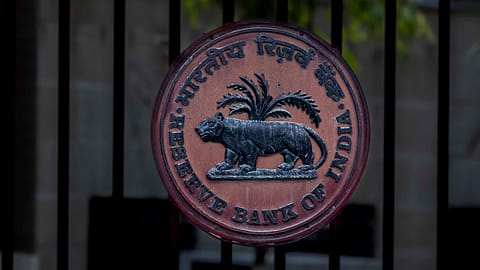Extreme weather conditions, prolonged geopolitical tensions to keep crude oil prices volatile: RBI
"Overall, the second-round effects of food and fuel inflation on headline have become subdued, especially after the adoption of flexible inflation targeting (FIT) in India," says the apex bank.

The Reserve Bank of India has said that extreme weather events may pose a risk to inflation along with prolonged geopolitical tensions that could keep crude oil prices volatile.
The RBI released its article titled ‘Food and Fuel Prices: Second Round Effects on Headline Inflation in India’, in a monthly bulletin on Tuesday stating that the CPI (consumer price inflation) has gravitated to 4.9% in March after averaging 5.1% in January and February.
Notably, the country’s retail inflation eased to a nine-month low of 4.85% in March, remaining within the central bank’s tolerance band of 4-6%. Inflation of vegetables surged to 28% while pulses saw a 17% rise in inflation rate. Headline inflation has eased to 5.1% during January and February 2024 from 5.7% in December 2023, with core inflation declining steadily over the past nine months. Food inflation pressures, however, were accentuated in February.
On the other hand, the wholesale inflation surged to 0.53% in March, as against 0.33% and 0.20% in February and January, respectively. The wholesale inflation for primary articles including food items stood at 4.5% in March, whereas that of fuel and power at -0.77% during the month under review.
“Supply shocks play a significant role in shaping inflation dynamics, with first and second-round effects exerting distinct but interconnected influences on prices and economic activity. The first-round effects typically manifest as immediate changes in the prices of goods and services directly affected by the shocks originating from a variety of sources, including geopolitical events, natural disasters, technological innovations and policy interventions. The second round of effects occurs after the transmission of initial price changes to other sectors of the economy through various channels. These channels include input-output linkages, wage adjustments, and expectation formation,” say Harendra Kumar Behera and Abhishek Ranjan, authors of the article.
The article highlights the existence of subdued second-round effects of food and fuel inflation on headline inflation. RBI says that the impact of food shock on core inflation has reduced over time, while that of fuel shock has increased recently.
“Overall, the second-round effects of food and fuel inflation on headline have become subdued, especially after the adoption of flexible inflation targeting (FIT) in India,” says the apex bank.
Recommended Stories
Moreover, the central bank attributes a better anchoring of inflation expectations to the decline in persistence and passes through of food shocks to core inflation.
Notably, during RBI’s monetary policy committee (MPC) meeting earlier this month, RBI Governor Shaktikanta Das said inflation - the elephant in the room - has now gone out for a walk and appears to be returning to the forest.
“We would like the elephant to return to the forest and remain there on a durable basis. In other words, it is essential, in the best interest of the economy, that CPI inflation continues to moderate and aligns to the target on a durable basis,” Das said.
Continuing geopolitical tensions also pose an upside risk to commodity prices and supply chains. Assuming a normal monsoon, CPI inflation for 2024-25 is projected at 4.5% with Q1 at 4.9%, Q2 at 3.8%, Q3 at 4.6% and Q4 at 4.5%, said the RBI governor.
(INR CR)